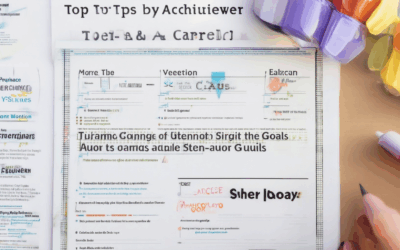In today’s fast-paced world, maintaining focus has become a cornerstone of productivity and personal growth. Whether you’re juggling multiple tasks, managing stress, or aiming to enhance your cognitive performance, mindfulness has emerged as a powerful tool to help individuals achieve peak focus. With countless methods, techniques, and practices available, finding the right mindfulness tips for focus can feel overwhelming. However, by exploring the fundamentals of mindfulness, understanding its role in enhancing concentration, and applying its principles in daily life, anyone can unlock the potential to cultivate sharper focus and greater clarity. This guide delves into the essential mindfulness practices, explores real-life applications, and provides practical examples to help you master mindfulness for improved focus.

How to Practice Mindfulness to Improve Focus
Mindfulness is a powerful tool for enhancing focus and concentration. By cultivating mindfulness, you can train your mind to stay present and engaged, leading to improved productivity and better decision-making. Here are some effective practices to incorporate mindfulness into your daily routine:
- Meditation Practice: Begin with just five minutes a day. Sit comfortably, close your eyes, and focus on your breath. Notice the sensation of air entering and leaving your body. If your mind wanders, gently bring your attention back to your breath. Over time, extend your practice to longer durations for deeper focus.
- Breathing Exercises: Use the 4-7-8 technique to calm your mind. Inhale deeply for four seconds, hold your breath for seven seconds, and exhale completely for eight seconds. Repeat this cycle three times to center your thoughts and reduce stress.
- Body Scan: Lie down or sit comfortably and scan your body from toes to head. Notice any sensations or discomfort. This practice helps ground you and reduces mental clutter, enhancing your ability to concentrate.
- Gratitude Journaling: Spend a few minutes each morning writing down three things you’re grateful for. This habit shifts your mindset to positivity, fostering a more focused and optimistic outlook throughout the day.
- Yoga and Movement: Engage in gentle yoga or stretching routines. Physical movement releases tension and improves circulation, allowing your mind to stay sharp and focused.
- Progressive Muscle Relaxation: Tense and release each muscle group from your toes to your head. This systematic approach helps relax your body and quiet your mind, promoting better focus.
- Visualization Techniques: Close your eyes and imagine yourself in a peaceful setting. Picture yourself succeeding at your goals to boost confidence and clarity. This mental rehearsal can improve your focus and motivation.
Incorporating these mindfulness practices into your daily life can significantly enhance your focus and overall well-being. Remember, consistency is key. With regular practice, you’ll develop stronger attention skills and greater mental resilience.
For more resources and guided practices, visit 7Del.net to explore our comprehensive guides on mindfulness and self-improvement.
What Are the 3 C’s of Mindfulness?
Mindfulness is often broken down into three key components, known collectively as the “Three Cs.” These principles guide individuals in developing a deeper understanding and practice of mindfulness. Here’s a breakdown of each:
- Attention :
- Definition : Focuses on cultivating present-moment awareness.
- Importance : It involves noticing sensations, emotions, and thoughts without judgment. This helps in staying grounded and engaged in the current experience.
- Acceptance :
- Definition : Involves embracing experiences with curiosity and openness.
- Importance : It encourages individuals to accept their thoughts and feelings as they are, fostering a non-judgmental mindset.
- Intention :
- Definition : Relates to setting a purpose or direction for one’s mindfulness practice.
- Importance : It helps in aligning the practice with personal goals, such as reducing stress or enhancing well-being.
By integrating these three elements, mindfulness becomes a holistic approach to living fully and authentically.

The 5 R’s of Mindfulness
- Reflection: Mindfulness begins with reflection, where you observe your thoughts, feelings, and sensations without judgment. This helps in gaining clarity and understanding yourself better.
- Resilience: Cultivating resilience is crucial as mindfulness teaches you to handle stress and challenges with calmness and strength, fostering emotional balance.
- Recognition: Recognizing your emotions and thoughts is key. It allows you to stay present and respond appropriately rather than reacting impulsively.
- Response: Responding mindfully involves acting with intention and balance. This helps in managing difficult situations effectively.
- Release: Finally, release negative emotions. Techniques like deep breathing can help you let go of stress and find inner peace.

The Four Ps of Mindfulness Explained
Mindfulness is often broken down into four key components, known as the “Four Ps” of mindfulness. These principles guide individuals in cultivating awareness, intentionality, and adaptability in their daily lives. Understanding each component can help enhance mental well-being and foster a more balanced approach to life.
- Presence: Being fully engaged in the present moment. This involves mindfulness of one’s surroundings, emotions, and thoughts without judgment. Presence is crucial for building meaningful connections and appreciating life’s transient nature.
- Pacing: Managing time wisely and balancing activity with rest. Pacing allows individuals to work efficiently without rushing, promoting a healthy rhythm of productivity and relaxation.
- Priority: Setting clear intentions and focusing on what truly matters. This helps in aligning actions with personal values and goals, reducing distractions and enhancing productivity.
- Pivoting: Adapting to changes and remaining flexible. Life is unpredictable, and mindfulness teaches us to embrace shifts in plans with grace and resilience, fostering a mindset of continuous learning and growth.
By mastering these four Ps, individuals can develop a more mindful and intentional lifestyle, leading to improved mental health, stronger relationships, and greater overall life satisfaction. Visit our mindfulness resources for more insights and practices to integrate these principles into daily life.
What Are the 7 Cs of Mindfulness?
The 7 Cs of mindfulness are a powerful framework for cultivating awareness, self-awareness, and emotional intelligence. These principles guide individuals in developing a mindful approach to life, fostering well-being, and enhancing relationships. Here’s a breakdown of each component:
Connection
Connection refers to the ability to connect with oneself and others with empathy and understanding. It involves being fully present in the moment, acknowledging emotions, and resonating with the energy of those around you. Practicing connection helps build meaningful relationships and strengthens social bonds.
Compassion
Compassion is the foundation of understanding and kindness toward oneself and others. It involves recognizing shared humanity, responding with empathy, and offering support during challenging times. Cultivating compassion fosters resilience and promotes a culture of care and understanding.
Creativity
Creativity is the spark of innovation and self-expression. It involves thinking outside conventional boundaries, exploring diverse perspectives, and embracing change. By nurturing creativity, individuals unlock new possibilities and find unique solutions to life’s challenges.
Character
Character is the set of ethical and moral values that define one’s integrity. It encompasses honesty, respect, responsibility, and humility. Developing strong character builds trustworthiness and inspires confidence in oneself and others.
Contribution
Contribution is the act of giving back to the world in ways that matter. It involves serving others, supporting communities, and making a positive impact. By living a life of contribution, individuals find purpose and leave a lasting legacy.
Communication
Effective communication is the art of conveying ideas clearly and respectfully. It involves listening actively, expressing thoughts thoughtfully, and fostering mutual understanding. Mastering communication skills enhances relationships and resolves conflicts constructively.
Confidence
Confidence is the belief in one’s abilities and potential. It involves trusting oneself, taking calculated risks, and embracing growth opportunities. Building confidence allows individuals to navigate challenges with assurance and pursue their goals with determination.
By integrating these 7 Cs into daily life, individuals can cultivate mindfulness, enhance their well-being, and thrive in all aspects of existence. Explore more resources on mindfulness and personal growth at 7Del.net .

What are the 4 A’s of overthinking?
The 4 A’s of overthinking are effective strategies to help manage stress and reduce overanalyzing situations:
- Avoid : Identify situations that lead to overthinking and try to minimize exposure to them.
- Alter : Change your perspective or approach to tackle problems differently.
- Accept : Acknowledge your emotions without judgment and allow yourself to process feelings.
- Adapt : Find flexibility to adjust to changes and handle challenges as they arise.
By incorporating these strategies, you can reduce overthinking and approach life with greater clarity and confidence.




0 Comments